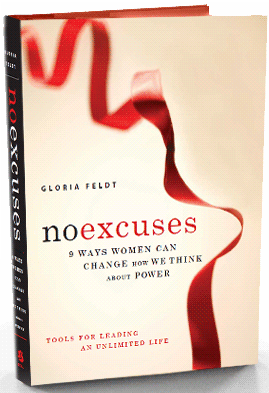Liberal Feminism: A How To Guide
Posted in Book Reviews on January 18th, 2011by Elizabeth
Tags: Feminism
No Excuses: 9 Ways Women Can Change How We Think About Power – Tools For Leading An Unlimited Life
by Gloria Feldt
After hearing Gloria Feldt on the RH Reality Check podcast I decided to read this book. It’s not a typical feminist book, not theory, history or biography – Feldt lays out a solid plan for women to make their feminist values a part of their lives.
It has been said that reading gives women dangerous ideas, and this book certainly gave me a few. I’ve been telling people that “No Excuses” is my motto for 2011.
Very early in the book, Feldt tackles one of my favorite questions – why don’t more women run for office?The reasons are complicated and can easily be applied to any number of questions about why women have not achieved equality in a given field. But there are ways to work around whatever these obstacles are – be they lack of resources, or internalized sexism and self doubt. Women involved in Emily’s Listor The White House Project often say that given a man and a woman of equal qualifications, the man is more likely to take the initiative and run for office and the woman is more likely to say that she is unqualified. However, a survey of women politicans shows that women are more likely to run if someone asks them to than to spontaneously decide for themselves. Thus was born She Should Run a website where anyone can nominate and encourage women they know to run for office.
It’s interesting to speculate what the future would look like if more women took on positions of power in government and business. A study reported in Politico reported that women are more effective legislators than men. Feldt often references the 30% threshold – this is thought to be the number of women necessary in a leadership role in an organization when they can have a substantial impact. The US Congress is far away from this at 17% but many corporate boardrooms, and even the Supreme Court are trending in that direction.
Feldt also encourages women to apply these principles to their marriages and personal relationships with men if they feel they are being treated unfairly.
A lot of Feldt’s argument relies on a belief that all women share common goals and should work together to achieve them.
It’s heartbreaking to me that in our half-finished feminist revolution, women still tend to isolate themselves, to think that their problems are individual concerns that they must solve alone. We feel our lack of power to make change, because when one person tries to fight the system alone, she is, in fact, relatively powerless. It’s when we just think of ourselves as individuals rather than reaching out to our sisters and brothers that things are likely to stay the same for the next women that comes along. More than that, if we fail to recognize how our choices influence the world – either by reinforcing the status quo or challenging it – we’re doomed to live lives of diminished possibilities.
I can agree with that on paper. But sadly the feminist movement does have some history of racism, homophobia and classism in it’s past. Feldt does include women from a diversity of backgrounds as examples in her book. But I’m not sure what she would make of women who align themselves with all of the goals of feminism but refuse to take the label because of past wrongdoing. I do agree that some policies – equal pay, reproductive justice, and better daycare for example would benefit all women. But that has more to do with the systemic sexism/injustices (Patriarchy/Kyriarchy) that remain in our society than any inherent similarities that all women share. To argue otherwise would be arguing for a type of gender essentialism that I cannot accept.
Nevertheless, I really did enjoy this book, and I have been recommending it to women that I know. I had never thought about power before. When my Political Science professors would mention it, my eyes would glaze over. It was too theoretical a concept for me to be bothered with. I am a pragmatist at heart and this book does compliment that tendency. Feldt takes great care to explain exactly what she means by power, and calls her definition “power to.” As in the power to make change – in opposition to “power over” which is about hierarchy. Even so, there were a few instances of woo I could have done without. For example, I still do not understand what Feldt means by “live unlimited.” Unlimited from what? Patriarchy? Internalized sexism? Generic self-doubt? Gravity? Thetans?
Without a basic understanding of the concepts of modern day feminism, the book does sound more like the Law of Attraction than a way to put theory into practice. Take for example the idea that “power must be claimed.” I understand it to mean that if I want to start a blog or a new business or run for Senate, no one will do it for me but myself. Anyone familiar with Feldt’s amazing record of activism will know what she means. Without this background, the concepts are much more nebulous. It is also for these reasons that I prefer the more specific terms autonomy and intention (which are used in the book sometimes) than power and live unlimited.
This book is fundamentally liberal. In that I mean that it takes the position that women can take actions to improve their lives and the lives of other women. This philosophy is one I am firmly on the side of, and I admire the steps Feldt has taken on twitter and via other media to reach out to younger feminists to spread her ideas.
“No Excuses” is extremely valuable because many women struggle with the idea that they are powerful or have autonomy I wonder how much has to do with the kinds of stereotype threat described in Delusions of Gender. It’s something I struggle with and is much easier to confront when thinking of it as a part of feminist activism that most women struggle with than a unique personal insecurity.
Feldt summed it up best when she wrote:
Today our challenge is to value ourselves and demand that others do, too.


